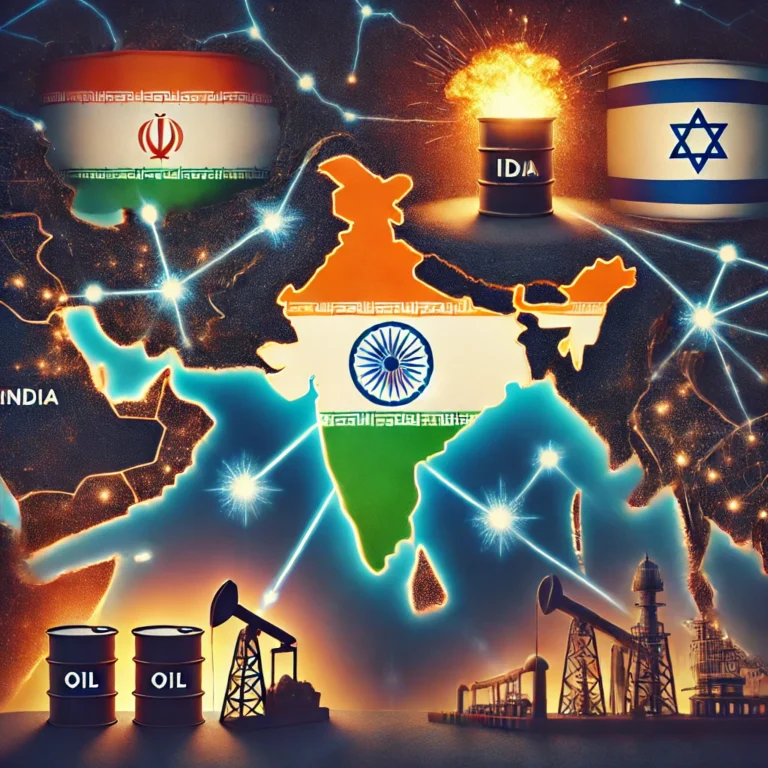The whole world is watching the tension between Iran and Israel escalation. India has reasons to be extremely concerned over the spill-over effects of the situation because it heavily invests in the good relations with both Iran and Israel. However, this conflict, sets apart a unique range of challenges and opportunities for India as it moves into the domains of economic relations, energy security, and geopolitical implications in broader meanings and scopes.
We would be discussing the implications for India in the Iran-Israel conflict and then relate it to economic, political, and security interests about how India can achieve its objectives in this sensitive region.
1. Impact on Energy Security
India imports a high percentage of its energy, relying heavily on Middle East oil to fuel its crude supplies. Although the sanctions imposed on Iran over the years have significantly impacted direct oil imports from that country, Iran remains an integral part of the energy strategy for India. This results from its strategic location and its vast oil reserves.
a. Global Oil Market Disruptions
An Iran-Israel confrontation could severely destabilize the entire region, thereby disrupting oil supplies in the Persian Gulf. This would generally be interpreted as higher oil prices, which would severely affect India’s energy security. India is also one of the largest importers of energy, so higher fuel prices might augment inflation and subsequently impact the broad economy.
b. Diversification of Energy Sources
In the event of a long-drawn conflict, India could hasten its diversification endeavors by focusing on sources from countries like Russia, the United States, and Africa.
Moreover, the conflict could hasten investments in alternate energy sources and nuclear energy in not wanting to be overly dependent on volatile oil market prices.
2. Economic and Trade Relations
Both Iran and Israel are important nodes in the trade network of India, though in different forms.
a. Iran: Strategic Economic Partner
Iran has been one of the key partners for India, especially after steps like the Chabahar Port. Located in Iran’s southeastern seaboard, this project connects India to Afghanistan and Central Asia, sans Pakistan. Critical in terms of regional connectivity and India’s trade strategies, Chabahar is thus imperative.
Such a conflict would be a strain on this relationship, pushing back infrastructure projects and disrupting trade routes. Iran’s relations with India may become even more complicated with tighter sanctions against it.
b. Israel: Electronics and Defense Collaboration
India’s relations with Israel are almost exclusively defence and technology related. India has seen Israel also as one of its major defense suppliers, besides collaborating with it on advanced technological fronts, such as in the fields of cybersecurity and water management and agricultural cooperation.
India would love to be able to maintain excellent relations with Israel, including defense and technology cooperation, at the same time looking after the complex diplomacy that the conflict has presented .
3. Geopolitical and Diplomatic Challenges
India has traditionally been bipartisan in her approach to foreign policy, mainly when it comes to the Middle East. India maintains excellent relations with both Iran and Israel; she is going to face a real challenge when it will try to navigate these relations in case of war.
a. Balancing Act of Relations with Israel and Iran
India finds itself closely aligned with Israel at the strategic level, especially on the frontline of defense and technology. India has traditionally been in very close relations with Iran for a long time, owing to its energy needs and other regional strategies. It will, therefore, be diplomatically tightrope-walking if they engage in a war over this particular issue.
At best, India will support one side at the expense of another, which might put a strain in its relationship with that country to which it is granting support. This may lead to potential implications on trade, defense cooperation, and diplomatic alliances. India would most likely take a neutral stand as it tries to play its card for strategic interests between the two.
This will further precipitate instability in the Middle East, which India has an interest in, being the destination of millions of its diaspora and holding a significant economic interest in the region. Millions of Indian expatriates work in the Gulf, remitting billions to their country every year. Any instability could potentially threaten the safety of these expatriates and may have some economic repercussions for the country.
In addition, conflict in the Middle East may heighten religious tensions within India that actually resonate well with the dynamics of the geopolitics of the region and its consequent domestic political and social groups.
4. Security Implications
The Iran-Israel conflict has very relevant security implications for India concerning terrorism and regional stability as well.
a. Increased Terrorist Activity
A long war may embolden terrorist groups and destabilize the Middle East and South Asia. Iran’s relationship with terrorist groups like Hezbollah and Hamas, as well as influence in Iraq, Syria, and Yemen, may lead to increased regional violence. Thus, instability may creep into South Asia and seep into India through Pakistan and Afghanistan.
b. Strategic Alliances
India will likely develop stronger strategic ties with countries like Saudi Arabia, the UAE, and the US in case of a conflict between Iran and Israel. The Quad Alliance constituted by the US, India, Japan, and Australia will also prove to be vital for maintaining regional balance and safeguarding the interests of India in the Indo-Pacific region.
5. Opportunities in the Crises
In spite of all the problems that the Iran-Israel conflict may create for India, the possibility of some opportunities cannot be ruled out.
a. Defense Ties to be Strengthened with Israel
India would, in case of a prolonged war, look forward to the strengthening of its defense ties with Israel. The defense technologies of Israel-medium missile defense systems, drones, and cybersecurity solutions are essential to India’s security strategy.
b. Regional Mediator
India, of course, is a longstanding well-wisher of both Iran and Israel, and its non-aligned foreign policy could make it a natural middleman; historically, India has played the role of a neutral country in most international conflicts, and this stance can help it to make a strong influence as a peacemaker on the world stage.
Conclusion
The Iran-Israel conflict is a complex affair for India, closely linked to energy security, economic interests, Strategic partnerships, diplomatic relations, and domestic security. This is a scenario where India needs to tread cautiously in its relations with both Iran and Israel while securing its economic and geopolitical interests. Thus, by taking a completely neutral posture during the strengthening of strategic partnerships and preparation for potential energy and trade disruptions, India can navigate these troubled waters and emerge stronger in the global forum.

